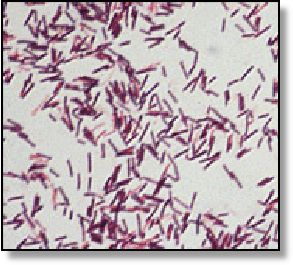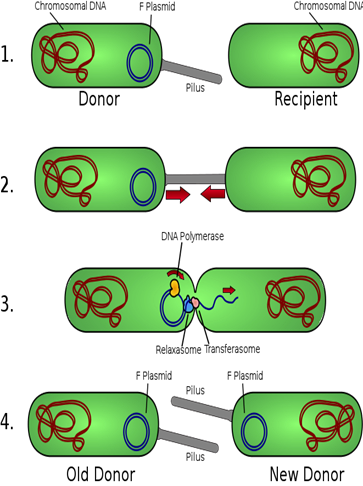Reproduction
 The way in which we produce our offspring, gametic meiosis,
is very
different than how bacteria and
Bacillus cereus reproduce. In fact it is
much simpler. The male doesn't have to buy the female anything,
there is no commitment between bacteria, and it's just plain
simple. Well, to start off there is no male or female in
bacteria, and do not even need a partner to reproduce!
The way in which we produce our offspring, gametic meiosis,
is very
different than how bacteria and
Bacillus cereus reproduce. In fact it is
much simpler. The male doesn't have to buy the female anything,
there is no commitment between bacteria, and it's just plain
simple. Well, to start off there is no male or female in
bacteria, and do not even need a partner to reproduce!
Often
Bacillus cereus undergoes
reproduction by the means of asexual reproduction (offspring are produced
from a single parent; no this does not marital status), more specifically
binary fission. Binary fission is the asexual reproduction method used by
all prokaryotes, it occurs when a single parent cell undergoes mitosis and
produces two equally sized daughter cells. Both daughter cells produced have
the potential to grow to the size of the parent cell. The down side of
binary fission is that both daughter cells are genetically identical.

In order for bacteria to evolve, there has to be a way in which genetic
information is exchanged between individuals. In
Bacillus cereus, this is accomplished by the process of
conjugation and transduction. This is the bacterial equivalence to sex in
eukaryotic species. This does not directly result in offspring being
produced, but rather the transfer of genetic material coding for a
characteristic displayed by the donor that the recipient does not have but
would benefit from. The exchange is made possible by the presence of a sex
pilus. Pictured right is the process of transferring genes from one
individual to another using the sex pilus. To see a video further describing conjugation and
transduction, click
here.
Conditions for which Bacillus cereus
reproduces are not very specific. It can produce in the sediment, food, or
an infected host such as us. Though optimal conditions for growth are as
follows: temperature between twenty-eight and thirty-five degrees Celsius,
Ph range from 4.3 to 9.3, and oxygen must be present.
So here's a joke for you! A human, a chicken, and salmonella all sit down
at a bar, the human asks says to the salmonella and chicken 'got
Bacillus cereus?' It's funny because they all interact with
Bacillus cereus! Okay, maybe it wasn't that hilarious, but check out what kind of interactions
Bacillus cereus takes part in at the
interactions page!
MultipleOrganisms.net
Home page
Contact me